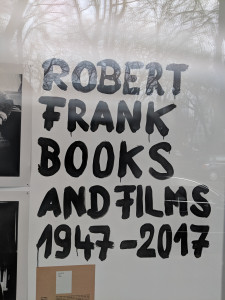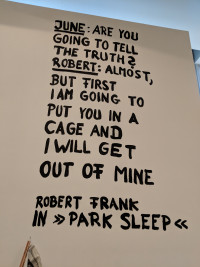



On Tuesday January 30, 2018, Joseph Gallivan interviews Zemie Barr [PRONOUNCED ZEMMY] exhibitions manager at Blue Sky Gallery, about “Robert Frank, Books and Films 1947-2018.” Barr talks about Frank’s influence on street photography, his relationship to the Beatniks and the concept of the disposable show. Frank’s photos are printed on newsprint and will be destroyed at the end of the run.
FROM THE PRESS RELEASE:
https://steidl.de/Artists/Robert-Frank-1013194243.html
Robert Frank
Books and Films 1947-2018
Robert Frank is considered the inventor of street photography. With his method of sequencing and composing pictures in intuitive series beyond the traditional photographic essay, he has developed new forms of expression within the medium of photography.
Despite Frank’s significant influence on photographers of his own and subsequent generations, there are only few exhibitions of his work. Frank’s original silver gelatin prints are today fragile objects, and most are not on public display. Galleries, museums, and investors lend Frank originals only under limited conditions of display with exorbitant insurance costs, which makes organizing traditional exhibitions very difficult. This traveling exhibition, meant to be shown primarily at universities and schools, seeks to remedy that.
Conceived by Robert Frank and Gerhard Steidl, this exhibition shows Frank’s work in photos, books, and films in a direct, accessible manner. Frank’s images are printed on sheets of newsprint and hung on the walls or from the ceiling. Frank’s films and videos, which are so often overshadowed by his photographic work, are shown on small portable “beamers” projecting them directly onto the walls. Finally, the exhibition will be disposed of after display, thus circumventing the normal cycle of speculation and consumption in the art market. When the idea for this pop-up show first reached Frank in his small, crooked house in the Canadian village of Mabou, he said: “Cheap, quick, and dirty, that’s how I like it!”
In addition to the films in the exhibition, the NW Film Center will be holding a film series of Robert Frank’s work during the month of January.
This exhibition is printed by Steidl and made possible by the generous support of The Harold & Arlene Schnitzer CARE Foundation/Arlene Schnitzer and Jordan Schnitzer, Steve Tisch, the Steve Tisch Family Foundation, and the Richard Ehrlich Family Foundation.
Robert Frank was born in Zurich, Switzerland, in 1924 and emigrated to the United States in 1947. He is best known for his seminal book The Americans, first published in 1959, which gave rise to a distinctly new form of photobooks, and his experimental film Pull My Daisy, made in 1959. Frank’s other important projects include the books Black White and Things(1954), Lines of My Hand (1972), and the film Cocksucker Blues for the Rolling Stones (1972). He divides his time between New York City and Nova Scotia, Canada.
GALLERY
Tuesday - Sunday, 12 - 5 pm
First Thursday 6 - 9 pm
122 NW 8th Avenue,
Portland, Oregon 97209 USA
503-225-0210
Free admission
Joseph Gallivan has been a reporter since 1990. He has covered music for the London Independent, Technology for the New York Post, and arts and culture for the Portland Tribune, where he is currently the Business Reporter. He is the author of two novels, "Oi, Ref!" and "England All Over" which are available on Amazon.com
This show was recorded at KBOO on Jan 27 in Studio 3. It was edited by KBOO Public Affairs producer Derric Crooks.
- KBOO

